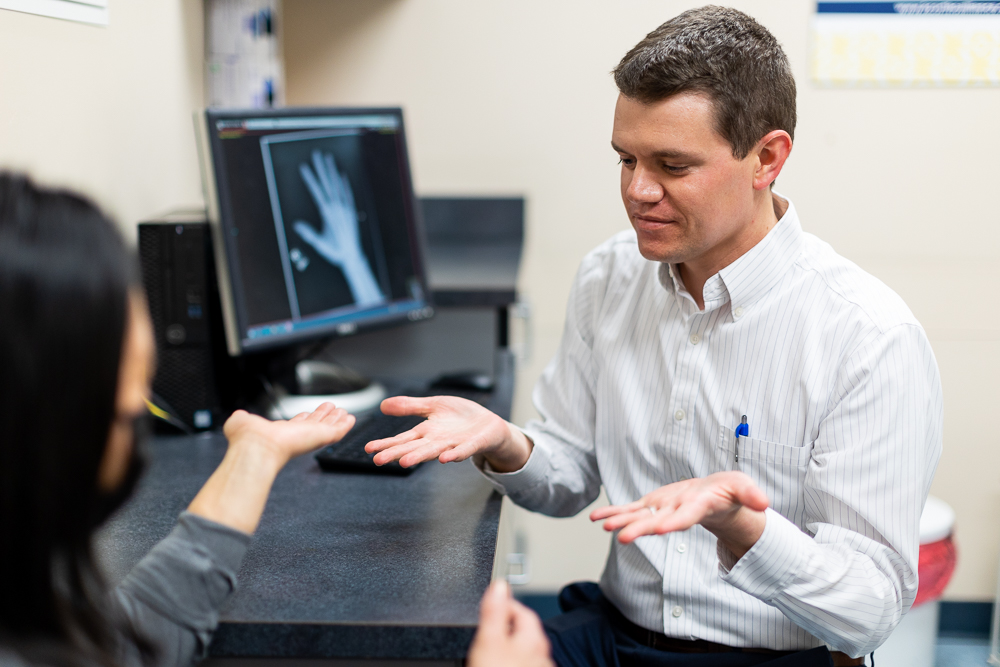
Neck and back pain can be debilitating. Dealing with injuries and chronic pain in your spine is not only agonizing, but it can keep you from enjoying the activities you love. Whether it’s spending time with your family or engaging in your favorite hobbies, the team at Kansas City Orthopedic Alliance is committed to improving your health and wellbeing.
KCOA has a dedicated spine team consisting of surgeons and interventional physiatrists. Our surgeons include: Dr. David Clymer, Dr. Josh Karlin and Dr. Theodore Koreckij. Our interventional physiatrists are: Dr. C. Lan Fotopoulos, Dr. Michael Khadavi, Dr. Brittany Moore, Dr. Fermin Santos and Dr. Daniel Sisk. KCOA providers are highly trained and uniquely qualified to perform nearly every neck and back treatment you may need. Our goal is always to ensure that our patients feel educated and empowered to make the best decision for their individual needs.
Throughout your treatment process, we’re committed to providing you with the education, recommendations, and support you need to achieve the best possible outcome. If spine surgery is determined to be the best option for you, our expert care team will be with you every step of the process from treatment to recovery.
Below, we’ll explain how patients can know whether spine surgery is needed, what to do prior to your procedure, and the spine surgery recovery process.
How Do I Know If I Need Spine Surgery?
First and foremost, it’s important to know that spine surgery is a major procedure and not a decision one should make lightly. Before recommending surgery, your providers and care team will explore and exhaust more conservative, less invasive treatment options shown to provide relief.
Some of these conservative treatments that we may recommend include:
- Activity Modification
- Physical Therapy
- Stretching
- Yoga
- Medications
- Injections
- And more
Ultimately, spinal issues can develop in a number of different ways. Many issues are the result of degenerative changes that form over time as you age, specifically in the spine and intervertebral discs. Repetitive movements as well as static positions, such as standing and sitting constantly, may have also had an impact on spinal health.
Traumatic injuries can also cause a patient to require spine surgery. Most often, these injuries include acute disc ruptures, fractures, and nerve injuries. If you’re experiencing any of the following symptoms, it may indicate a need for spine surgery:
- Uncontrolled pain
- Loss of function or significant weakness (i.e. foot drop) &
- Loss of bowel or bladder control
We recommend a spine surgery procedure only after it’s abundantly clear that surgery is the best option for restoring function and alleviating symptoms. Your spine surgeons at Kansas City Orthopedic Alliance will collaborate with you and your family in order to ensure that surgery is in your best interest.
Your Initial Consultation & What to Know Before Spine Surgery
When you visit KCOA for your initial consultation with our spine surgeons in Kansas City, you’ll be asked to bring a number of items for your care team to review. This information helps your provider and team paint a complete picture of your current condition and status.
These items will include:
- Any films, images, or notes from previous treatments of this condition
- A completed medical history form
- A listing of all medications
- Your identification
- Your insurance card
- A form of payment, typically a credit card that you can place on file
During your initial consultation with KCOA, your provider and care team will walk you through the entire process of what to expect with your treatment. We’ll discuss your individual challenges, needs, and goals to develop a plan that uniquely cares for your specific issues. Following this consultation, we’ll provide a recommendation for treatment that will, ideally, allow you to resume your day-to-day life as you see fit.
If a spine procedure is determined to be your best treatment option, your provider will give you specific recommendations to follow before your procedure. It’s crucial that patients follow all instructions to ensure a successful outcome.
In many instances, these instructions may include things like activity modification, rest, increasing fluid intake, smoking cessation, and proper nutrition. Additionally, your provider may also recommend physical therapy in order to improve mobility and strength. Physical therapy can benefit patients by improving the procedure’s outcome and reducing the recovery time.
Your Spine Surgery Procedure
In terms of your actual procedure, there are different spine surgeries that KCOA can provide based on the needs of our patients. Two of the most commonly performed procedures are laminectomy and spinal fusion.
A laminectomy involves removing a small section of bone in order to create more space for the spinal cord or nerve roots. A spinal fusion is normally deployed to treat spinal instability or scoliosis. During this procedure, the bone may be implanted between two vertebrae and held in place using rods, screws or cages to support the stabilized segment.
Other surgeries commonly performed at KCOA include: discectomies, fracture repairs and spondylolisthesis corrections. These surgeries are performed by KCOA’s spine surgery team consisting of Dr. Theodore Koreckij, Dr. Josh Karlin and Dr. David Clymer. The length of your surgery is based mostly on the type of procedure we perform. The most invasive surgeries may last up to 4-6 hours. However, we can perform many procedures in 2 hours or less.
Other procedures performed at KCOA can help with herniated discs, nerve-related issues and fracture management. These procedures are commonly performed by our team of interventional physiatrists: Dr. C. Lan Fotopoulos, Dr. Fermin Santos and Dr. Michael Khadavi.
Recovery From Spine Surgery
It’s difficult to predict the exact recovery timeline for spine surgery. Not only is the recovery period dictated by the specific type of injury, but the type of procedure and your desired lifestyle post-treatment will also play a role. However, it’s typical of any type of spine procedure to have a period of active rest, which may include some immobilization.
The main reason behind this active period of rest is to protect the affected area. During this period, your body will work to reduce inflammation and begin to heal. Once a patient completes the rest period, they’ll progress to a recovery phase. During this time, your provider and care team will instruct you to increase your mobility with activities such as walking or physical therapy.
Once your care team can identify healing in the affected area, along with increased strength and decreased pain levels, we can begin the next phase of recovery. This stage will include your care team determining when a patient can return to normal activities, including work, sports, and typical daily functions. Again, this timeline will ultimately depend on the individual patient’s needs, goals, and requirements.
In general, some of the longer recoveries occur following a fusion procedure. It’s very normal for patients to take anywhere between 12-24 weeks to fully recover from this type of procedure.
At the end of the day, it really comes down to the fact that recovery from a spine surgery is an individual process. Our team will be with you the entire way and help guide you to achieve your best outcome.
Is the Recovery Process Painful?
At KCOA, our spine surgeons in Kansas City make it a point to provide an honest assessment of what patients can expect during treatment and recovery. Our providers do their absolute best to discuss and set expectations for all patients about what their recovery will look like.
Ultimately, while pain is subjective and varies by person, it’s rare for someone to have a pain-free experience at the start of their recovery process. That said, many patients do experience significant relief even in the hours following their procedure. This is due to the fact that many of our patients undergoing a surgical procedure were in severe pain prior to surgery.
The providers and care teams at KCOA are always mindful of our patients’ wellbeing. Rest assured, our staff will do everything in our power to minimize symptoms. At the same time, we’ll collaborate with patients, their families, their primary care providers, and their pharmacists to ensure that best practices are always followed to ensure effective pain management.
When Can I Resume Normal Activities?
In many cases, people can return to their normal activities following spine surgery. Once again, this is dependent on what those activities are and how they’ll stress or strain the treated area. It will also depend on how closely the patient follows their post-procedure instructions, as well as their active participation in recovery.
In terms of mobility following surgery, patients can generally expect to begin normal movements fairly quickly. Once again, this also depends on what “mobility” means to the patient. You shouldn’t expect to play sports or engage in vigorous activity immediately following surgery. However, many patients can walk, climb stairs, and perform a number of other daily activities just a few days to weeks following surgery.
Have Questions About Treatments & Spine Surgery? Get in Touch With a Spine Surgeon in Kansas City Today!
At Kansas City Orthopedic Alliance, we’re dedicated to creating a superior patient experience for all. If you’re considering spine surgery in Kansas City to treat your neck and back issues, our team will work with you to ensure the best possible outcomes.
Scheduling an appointment with one of our providers allows us to find the best treatment option for you. Using the highest quality technology, we can pinpoint the underlying issue causing your pain or discomfort.
For a thorough evaluation, call us at (913) 319-7600 or schedule an appointment today. You can also use our symptom tracker tool if you’re struggling with pain and looking for proper treatment recommendations.


